Cognitive Rehabilitation for Seniors After Neurological Events

As we age, neurological events such as strokes, traumatic brain injuries, and dementia-related cognitive declines can impact a senior's ability to function independently. These challenges can affect memory, attention, problem-solving, and other cognitive skills essential for daily life.
Cognitive rehabilitation is a proven approach to help seniors recover and regain their abilities. This therapy combines personalized exercises, tools, and strategies to improve cognitive functioning and enhance quality of life.
In this blog, we’ll explore what cognitive rehabilitation entails, its benefits, and how it can make a difference in the lives of seniors.
What Is Cognitive Rehabilitation?
Cognitive rehabilitation is a therapeutic process designed to improve or restore cognitive functions that may be impaired due to neurological events. These therapies are often used after:
- Strokes
- Traumatic brain injuries
- Dementia-related declines
- Brain surgery
- Other neurological conditions
The goal is to enhance brain function, teach compensatory strategies, and improve the individual’s overall quality of life.
Core Components of Cognitive Rehabilitation
Cognitive rehabilitation typically involves two primary approaches:
1. Restorative Techniques
Restorative techniques aim to rebuild lost cognitive skills by stimulating neuroplasticity—the brain's ability to form new connections. Activities may include:
- Memory games and puzzles
- Problem-solving exercises
- Focused attention tasks
2. Compensatory Strategies
When complete recovery isn’t possible, compensatory strategies help seniors adapt to their cognitive challenges. Examples include:
- Using memory aids like calendars or apps
- Breaking tasks into smaller steps
- Creating structured daily routines
Benefits of Cognitive Rehabilitation for Seniors
Cognitive rehabilitation provides several key benefits for seniors recovering from neurological events:
1. Improved Cognitive Function
Therapies can enhance memory, attention, and problem-solving skills, making daily tasks more manageable.
2. Increased Independence
By regaining cognitive abilities, seniors can perform more tasks independently, boosting their confidence and reducing reliance on caregivers.
3. Enhanced Emotional Well-Being
Cognitive improvements often lead to better emotional health. Seniors may feel less frustrated or anxious as they regain control over their lives.
4. Better Social Interaction
With improved communication and memory, seniors can better connect with family and friends, reducing feelings of isolation.
Cognitive Rehabilitation Techniques
Therapists use a variety of techniques tailored to the senior’s unique needs:
1. Memory Training
Activities like word recall, association exercises, and journaling can improve memory retention and recall.
2. Attention Training
Focused tasks, such as sorting objects or playing attention-based games, help improve concentration.
3. Executive Function Exercises
Problem-solving activities and decision-making tasks strengthen planning and organizational skills.
4. Language and Communication Support
Speech therapists use exercises to help seniors regain language skills, such as vocabulary recall and sentence formation.
5. Physical Activity and Brain Stimulation
Gentle exercises like yoga or tai chi can stimulate brain activity and improve cognitive performance.
Who Can Benefit from Cognitive Rehabilitation?
Cognitive rehabilitation is ideal for seniors recovering from:
- Strokes: Many stroke survivors experience memory loss, speech difficulties, or reduced problem-solving abilities.
- Traumatic Brain Injuries: Accidents can disrupt brain functions, requiring targeted therapy to regain skills.
- Dementia or Mild Cognitive Impairment: Early intervention can slow cognitive decline and improve quality of life.
- Parkinson’s Disease or Multiple Sclerosis: Cognitive rehab can address memory and attention challenges related to these conditions.
How Cognitive Rehabilitation Works
1. Assessment
The process begins with a thorough assessment by healthcare professionals, including neuropsychologists, speech therapists, and occupational therapists. This evaluation identifies specific cognitive deficits and creates a personalized therapy plan.
2. Customized Treatment Plan
Based on the assessment, therapists design a program targeting the senior’s needs, incorporating both restorative and compensatory techniques.
3. Regular Therapy Sessions
Therapy may involve one-on-one sessions, group activities, or at-home exercises. Progress is continually monitored and adjustments are made as needed.
4. Family Involvement
Families are often included in the process to ensure consistent support and practice at home.
Challenges and Overcoming Them
While cognitive rehabilitation offers many benefits, it may also present challenges:
- Resistance to Therapy: Seniors may feel overwhelmed or reluctant to participate. Patience and encouragement from family and therapists can help.
- Slow Progress: Recovery takes time, and setting realistic expectations is essential. Celebrating small victories can boost motivation.
- Cost of Therapy: Some therapies may not be covered by insurance. Exploring community resources or financial assistance programs can help.
The Role of Caregivers in Cognitive Rehabilitation
Caregivers play a vital role in supporting seniors during cognitive rehabilitation. Here’s how they can help:
- Encourage Participation: Motivate your loved one to attend therapy sessions and complete exercises.
- Reinforce Techniques at Home: Practice memory or problem-solving exercises regularly.
- Provide Emotional Support: Be patient and empathetic as your loved one navigates recovery.
When to Consider Cognitive Rehabilitation
If your loved one shows signs of cognitive challenges, such as difficulty remembering names, following conversations, or completing everyday tasks, it may be time to explore cognitive rehabilitation. Consult a healthcare professional for an assessment and recommendations.
Final Thoughts
At Heisinger Bluffs, we understand the importance of cognitive rehabilitation in helping seniors recover after neurological events. Our dedicated team provides compassionate care and personalized support to promote recovery and improve quality of life. Contact us today to learn more or schedule a visit.
Frequently Asked Questions
How long does cognitive rehabilitation take?
The duration varies based on the individual’s needs and the severity of cognitive challenges. Some may benefit from a few weeks of therapy, while others may require ongoing support.
Is cognitive rehabilitation covered by insurance?
Coverage depends on the specific insurance plan and the reason for therapy. It’s essential to consult your provider to understand your options.
Can cognitive rehabilitation help with age-related memory loss?
Yes, cognitive rehabilitation can benefit seniors with mild cognitive impairments or age-related memory loss by enhancing memory, attention, and problem-solving skills.











